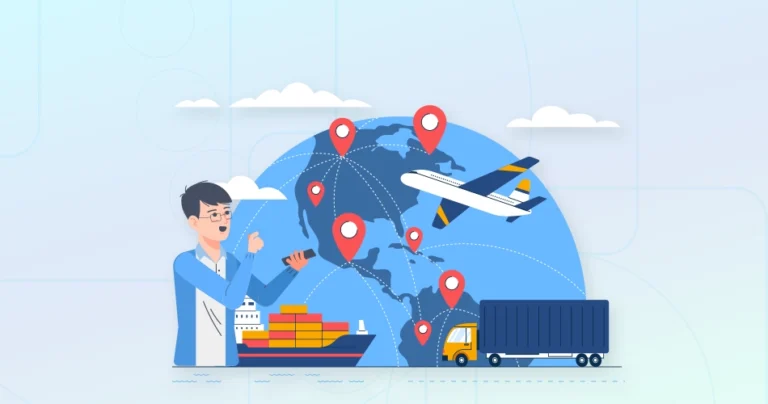Nowadays, people can have almost anything shipped at their doorstep through an eCommerce website, from a little hairpin all the way to even a car. That goes beyond just building the perfect eCommerce website and placing the best products. One of the key parts of eCommerce fulfillment is shipping.
This invisible entity helps you transform an online purchase into a tangible experience, and is a key to ensuring the best customer perception and loyalty. But there are so many things to understand about shipping, from types and models, carrier options, and software, to the rates and costs associated with it.
As a leading eCommerce development company, we will provide you with all the information you need to implement shipping for your eStore.
What is eCommerce Shipping?
eCommerce Shipping is the process of getting the products from your eStore website to the customers. That covers everything from the moment the customer places the order to the moment they receive it.
Key Stages of eCommerce Shipping
Shipping involves a range of tasks that can make or break your customers’ experience on your website.
Order Processing
Shipping process kicks off right from the order placement. It involves verifying their information (and order details) and checking inventory availability. You will also need to calculate the shipping costs depending on factors like weight, dimensions, and destination.
Order Fulfillment
Right after the order confirmation starts the fulfillment. That would, most likely, involve generating the item list, selecting and packaging the products to ensure they arrive safely. You will also need to attach any necessary documentation (like invoices or packing slips).
Shipment & Delivery
You’ll choose a shipping carrier (like USPS, FedEx, DHL, etc.) based on factors like cost, speed, and the customer’s preferences. The package is then handed off to the carrier for transportation to the final destination.
Tracking & Returns
Most carriers offer tracking numbers that allow customers to monitor their package’s progress. You’ll also want to have a clear and streamlined return policy in place in case of damaged items or changes of mind.
So you can see how eCommerce shipping can go beyond just getting your products to the customers. And if you want to expand your reach globally, the role of shipping becomes that much more significant. Plus, you may need to implement a shipping management software for better fulfillment.
If you want expert help with that, consult with our eCommerce website development company.
Types of eCommerce Shipping
When it comes to shipping the products from your eCommerce website, there is no one-size-fits-all solution. The most suitable shipping model will depend on your products, target audience, and the overall business goals.
Let’s look at the popular eCommerce shipping types and models:
- Same-day Delivery: The ultimate in speed and convenience, ideal for time-sensitive purchases or customers willing to pay a premium. It’s perfect for things like fresh flowers or birthday gifts.
- Overnight Shipping: Gets your products to customers within 24 hours, perfect for urgent needs or high-value items.
- Expedited Shipping: Faster than standard shipping but not quite overnight, offering a good balance between speed and cost.
- Standard Shipping: The most common choice, offering delivery within a set timeframe (usually 3-7 business days) at a reasonable cost.
- Flat Rate Shipping: A single price charged for all orders, regardless of weight or destination. It’s ideal for stores with products of similar weight and size.
- Free Shipping: A strategic decision to eliminate sticker shock at checkout and incentivize purchases. Remember, the cost is often factored into the product price.
- International Shipping: Reach a wider audience but be prepared for more complex logistics. That includes customs regulations and potentially longer delivery times.
If you want to understand which of these shipping models would be suitable for your business, opt for our eCommerce consulting services.
Top eCommerce Shipping Carriers
Sometimes, the shipping carrier makes all the difference in order fulfillment; it’s a key part of delivering a smooth customer experience. There are several top options available and each of them has its strengths to consider.
FedEx
FedEx is outstanding for speed and reliability, with a robust network for domestic and international shipping. They offer a range of solutions, from overnight delivery (for urgent needs) to express options (for faster turnaround times). Their services are well-suited for businesses shipping time-sensitive or high-value items.
UPS
UPS is world-renowned for its dependability. It caters well to business selling and shipping heavier products or requiring expedited deliveries. They offer extensive domestic and international coverage, ensuring your packages reach customers across the globe. Consider UPS if you prioritize tracking, transparency, and a wide range of service options.
USPS
USPS is a US-centric trusted and affordable shipping carrier. They provide a spectrum of services, including standard mail for budget-conscious shipments. You can also get Priority Mail for faster delivery and Priority Mail Express for overnight deliveries. All in all, it’s a great choice for domestic eCommerce businesses, especially those focused on affordability.
DHL
DHL, or Deutsche Post DHL, is a global giant with a strong presence in international shipping. So if you are trying to expand your reach, DHL would be a powerful option. They offer a variety of solutions for businesses of all sizes, from cost-effective options to express services.
This service excels in complex international logistics, navigating customs regulations and ensuring smooth cross-border deliveries.
Blue Dart
A leading Indian courier delivery services company, Blue Dart offers a reliable and secure domestic network across India and South Asia. They are especially popular for time-sensitive and high-value shipments, providing services like express delivery and secure cash on delivery options.
Blue Dart is a strong contender for Indian eCommerce businesses looking for a domestic partner with a focus on security and speed.
Although these are the top shipping options, which would be suitable for you? For that, you need to consider a few key factors.
How to Choose the Best eCommerce Shipping Company?
The most suitable option for eCommerce shipping would depend on your particular requirements. So you have consider factors like:
- Cost: Compare rates from different carriers based on weight, dimensions, and destination.
- Speed: Evaluate the delivery timeframe expectations you want to set for your customers.
- Services Offered: Look for features important to you, such as tracking, insurance, or signature confirmation upon delivery.
- Coverage Area: Ensure the carrier delivers to your target markets, especially if you cater to international customers.
All-in-all, you need to make sure the costs are competitive, customers are satisfied, and the business runs smoothly. If the carrier isn’t a good fit, choose another.
What are the Costs of eCommerce Shipping?
The cost of eCommerce shipping for any eStore can vary based on a variety of factors. Let’s look at these factors in detail:
- Package characteristics: The main characteristics of any package are the weight and dimensions. With weight, the heavier the package, the higher the costs, and vice-versa. And with dimensions, the larger, bulkier packages will incur higher costs.
- Shipping Distance: The farther a package needs to travel, the more it will cost to ship. Carriers typically divide locations into zones, with costs increasing as zones get farther from the origin.
- Shipping Speed: Faster delivery options like overnight or expedited shipping come at a premium compared to standard ground shipping.
- Additional Services: Services like signature confirmation, adult signature required, or insurance add to the base shipping cost.
- Carrier Rates: Different carriers have their own pricing structures. So you need to compare rates from multiple providers to find the most cost-effective option for each shipment.
- Negotiated Rates: High-volume businesses may be able to negotiate discounted rates with carriers based on their shipping volume.
- Free Shipping: The word “free” is always attractive to customers. But offering free shipping often means factoring the cost into the product price. Or you can set a minimum order value to qualify.
Overall, a well-designed shipping strategy will ensure the best customer experience and save you money.
Conclusion
eCommerce shipping takes care of everything between order placement and order delivery. It involves tasks like order processing, selecting carriers, calculating shipping costs, shipment tracking, and handling returns.
Remember, a transparent approach with clear communication of shipping options and costs is key to building trust with your customers. As your business grows, you may consider advanced strategies like multi-carrier shipping or real-time rate integrations. For international ventures, understanding incoterms and navigating customs regulations is crucial.
If you need help with setting up the eCommerce shipping for your website, connect with our experts today!
FAQs on eCommerce Shipping
Q1. How can I keep my shipping costs under control?
Here are some strategies to manage your shipping costs:
- Offer a variety of shipping options.
- Negotiate rates with carriers (for high-volume businesses).
- Optimize your packaging to minimize dead space and dimensional weight.
- Consider flat rate shipping for products with similar weight and size.
- Strategically use free shipping as a promotional incentive.
Q2. How does international shipping work?
International shipping involves additional complexities like customs fees and duties, impacting costs and delivery times. Understanding international shipping regulations is crucial.
Q3. What are the Incoterms I should be aware of for international eCommerce shipping?
Incoterms (International Commercial Terms) are standardized terms of sale that define responsibilities of buyers and sellers in international transactions. That includes aspects like risk transfer and customs clearance. Understanding Incoterms helps avoid confusion and unexpected costs.





